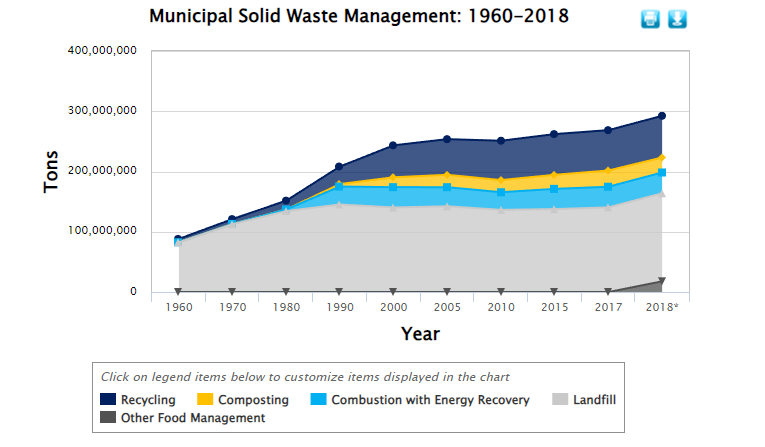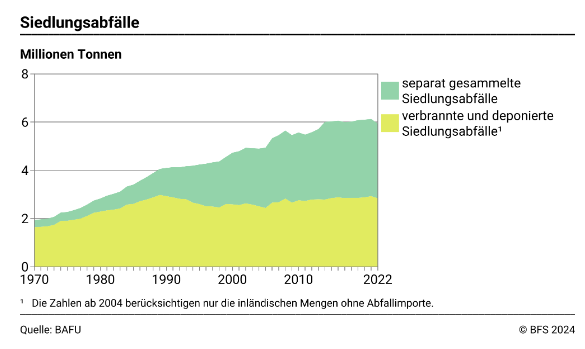Switzerland Spanks the U.S. in Everyday Sustainability

Greetings friends!
One of the world’s smallest countries radically outperforms America on sustainability. I wonder if it says something about the respective cultures in the two places and whether those cultural differences tell us about more than just trash.
Despite having very similar per capita GDP (i.e., both countries are wealthy) and high disposable income (citizens consume a lot of stuff), the Swiss generate less waste than Americans do.
- In 2022, Switzerland generated just under 6 million tons of waste, approximately 671 kilos per resident per year. (I’ve taken all figures for Swiss waste from the Swiss Federal Statistical Office.)
- In contrast, the United States generates almost 300 million tons of waste per year, according to the Environmental Protection Agency. On a per capita basis, the EPA estimates Americans generate some 811 kilos of waste per year, or about 21% more than the Swiss.
I was surprised to see just how much waste the Swiss generate. I think it’s a function of being relatively wealthy. You consume more when you have more money.
That said, the absolute amount of waste Swiss and Americans produce is less important than what happens to that waste.
Reduce, reuse, recycle — or chuck it in a landfill
In the U.S., landfills have long been the preferred method for disposing of trash. The U.S. still sends fully 50% of its waste to slowly fester in rotting piles.
Still, there have been positive developments. The U.S. also now recycles (24%), composts (8%), and incinerates (12%) some of its waste.

In Switzerland, a bit over 50% of waste is recycled and the rest is incinerated. None goes to landfills.

What explains the stark difference? Well, it’s partly because Switzerland is so darn tiny. The trash of a city like New York or Los Angeles would cover the whole of Switzerland in a few weeks if one were to spread it like some foul fairy dust. We just don’t have the room for landfills.
Then too, a great deal of what looks like trash to many Americans, the Swiss recycle. This includes the following:
- Paper, cardboard, and textiles
- Plant-based material
- Glass, metal cans, and aluminum
- Plastic, batteries, and electronics
You name it, the Swiss have found a way to recycle it. Some of these recycling processes are expensive, true. But the question the Swiss ask is “Compared to what?” As in, “Sure it costs something, but what will it cost us if we don’t deal responsibly with our waste?”
Out of sight, out of mind — Are we out of our minds?
As far as I can see, the Swiss never developed the habit of simply pushing unpleasant things out of sight. It takes a special mindset to dump one’s problems (literally in this case) out of sight and go quietly on one’s way as if that’s solved the problem.
I repeatedly saw evidence of this responsible long-term thinking in Switzerland.
- Being asked to vote on reforms to social security that would play out over 50 years.
- Infrastructure planning (roads, train stations, etc.) for growth we expected to be relevant first in 30 years.
- Adopting a statutory mechanism (the debt brake) to manage spending in good times and bad to avoid that Switzerland ever faces a national debt crisis.
And even more impressively, I’ve seen fellow citizens vote for the good of the country and not just their self-interest. Given a chance to add a week’s vacation to the annual requirement or establish a universal basic income for all citizens, the Swiss voted no each time. The reason? We had no money to pay for a new entitlement.
How refreshing to see honest discussions and sober votes about not just the wish list but the corresponding cost. (Although the Swiss aren't perfectly selfless, having recently voted to give retirees a raise in social security whose funding is unclear.)

Character determines the fate of societies
Our politicians do us no favors when they promise us sweet things that “someone else” will pay for. Free college, free health care, and child tax credits! The class warfare (the “rich” don’t pay their fair share) offered up to explain our rapidly rising debts is a risible misdirection. We’re all on the hook for America’s debt and no one can save us but ourselves.
You don’t need a Ph.D. in economics to realize that U.S. spending is on an unsustainable path. But it takes maturity to acknowledge this, to tackle it head-on and not to look away. Do we have it?
In contrast, it takes willful blindness to blithely carry on. Just like it takes willful blindness to pretend the U.S. suffers no border crisis, no gun violence problem, no epidemic of drug deaths, and no simmering pot of race tensions on the cusp of boiling over.
What does all this have to do with sustainability and trash, you might be wondering? Simply this. How a society deals with its waste tells us something about its citizens’ character.
- Do we look away and assume someone else will solve the problem?
- Do we offer excuses that solving the problem is hard or expensive?
- Are we willing to make sacrifices to secure our future?
Our answers not only reveal our character, but they spell out our destiny.
Be well.
If you don’t want stories like this to end up in the trash, unread and unremarked, do your part for the environment and subscribe to ensure they faithfully serve their purpose.






Member discussion